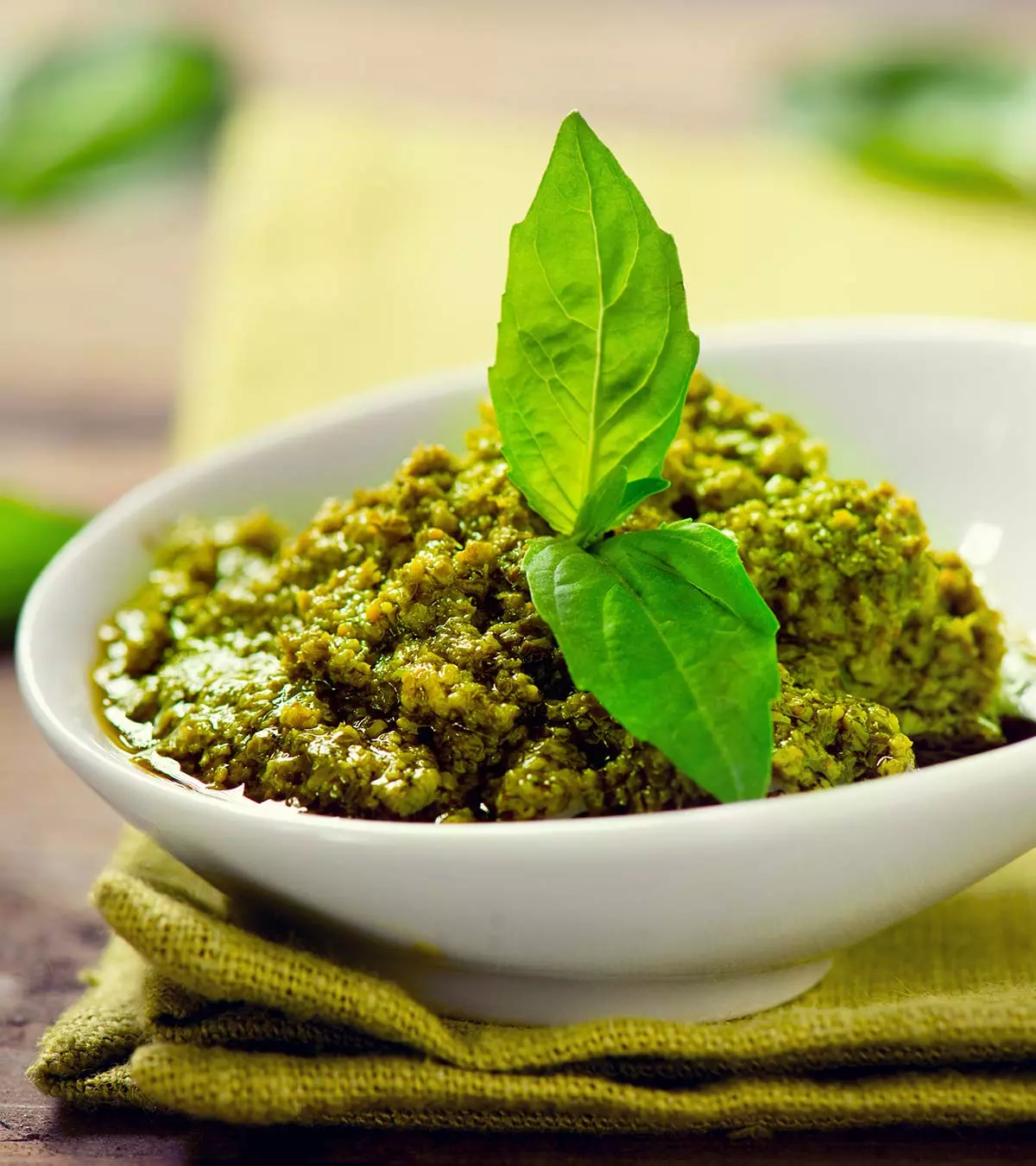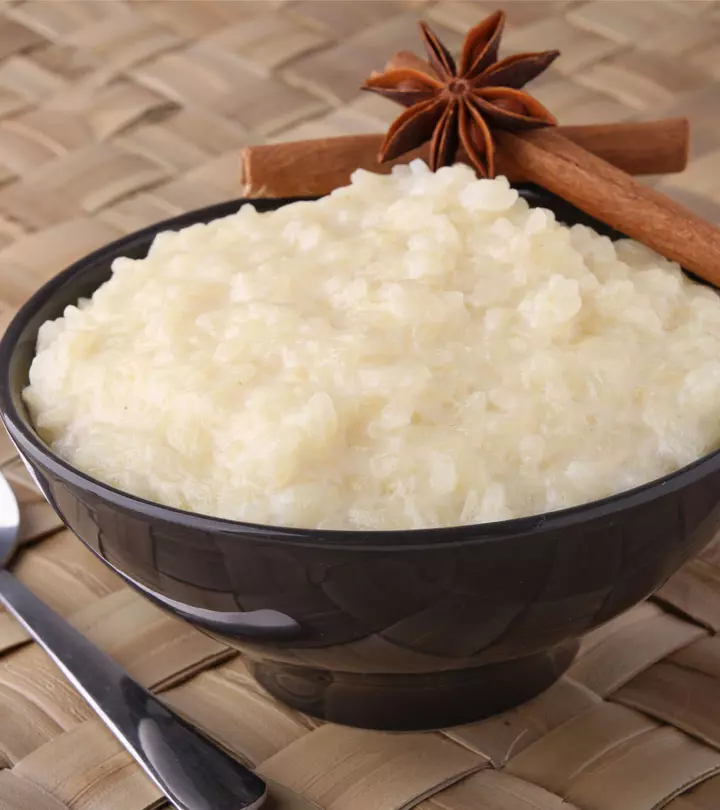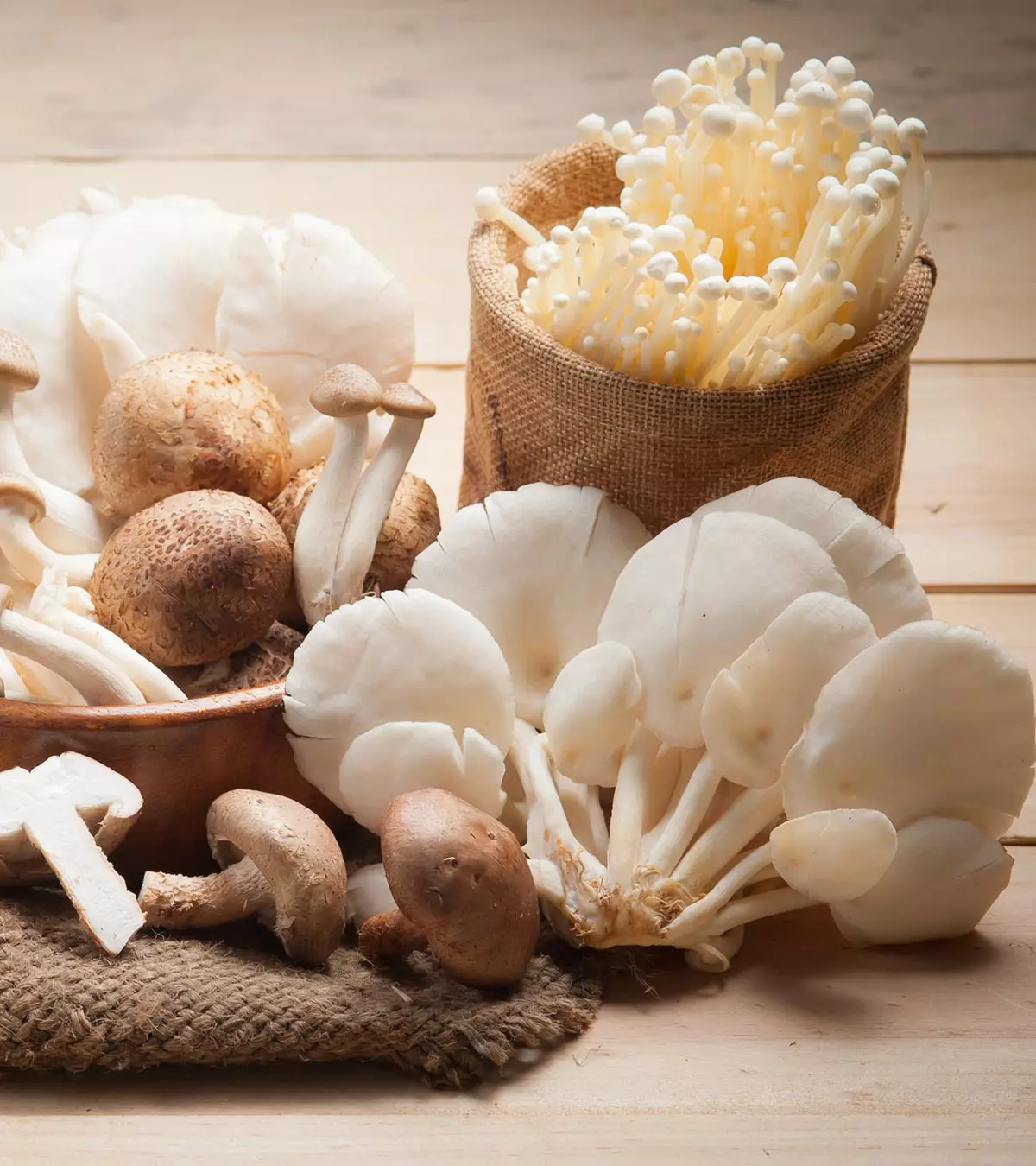
Image: Midjourney/ MomJunction Design Team
Women need milk during pregnancy to have a balanced diet. A mom-to-be needs to consume about two to three servings of milk per day unless there are any restrictions or limitations (1). It is a rich source of calcium, protein, and vitamin D, which are essential for a healthy pregnancy and fetal development (2). Additionally, milk contains all nine essential amino acids needed for sustenance, growth, and development, making it a valuable nutritional resource for both the mother and the baby (3) (4). But are there alternatives for those who cannot drink cow or animal milk? This post will help you understand the different types of milk, including their nutritional value and side effects, and guide you in choosing the right one for yourself.

Key Pointers
- Milk during pregnancy provides calcium, protein, vitamin D, heartburn relief, and hydration.
- Drinking raw milk can be dangerous for unborn babies due to the presence of harmful bacteria.
- Pasteurized milk is recommended, and low-fat milk is a good choice for its nutrients.
How Much Milk Should A Pregnant Woman Drink In A Day?
A pregnant woman can have around three glasses of milk, preferably the low-fat or non-fat variety, every day to benefit from it (1). However, the selection of milk will depend on the medical and prenatal nutritional status of the mother.
A study evaluated the relationship between the volume of milk consumed during pregnancy and its impact on pregnancy outcomes. The study report states, “Women who consumed ≤ 250 mL/d of milk (n = 72) gave birth to infants who weighed less than those born to women who consumed more (n = 207; 3410 g v. 3530 g, respectively; p = 0.07). Infant lengths and head circumferences were similar. Women who restricted milk intake had statistically significantly lower intakes of protein and vitamin D as well (5).”
It is important to be mindful of how much milk you consume during pregnancy. Some women may experience strong cravings for milk during pregnancy. Susanna, a mother to 6 children, shares her experience of craving milk during pregnancy. She says, “I usually hate milk but the last few weeks I’ve been craving it. It’s not that I have to be drinking it every second of the day but even just really needing a glass or two each day is strange for me because I typically avoid the stuff! Looking online, it seems this is a pretty normal craving for pregnant women to have…perhaps it has to do with the baby’s bone development? Or I could be calcium deficient. Anyhow…just an unusual craving for me (i).”
While cravings are common, it’s essential to consult a doctor to ensure you meet your nutritional needs without overindulging.
Benefits Of Drinking Milk During Pregnancy
Milk offers the following benefits during pregnancy:
1. Dietary calcium for bones
An expectant mother provides approximately 50 to 330mg of calcium to support the developing fetal skeleton (6).To fulfill this requirement, an expecting woman of 19 years and older are recommended to consume 1,000mg of calcium a day. Women under 19 are recommended to consume 1,300mg of calcium a day. One glass (250ml) of nonfat milk offers 309mg of calcium (7). Therefore, it is advisable to consume three to four glasses of milk to meet your everyday calcium needs during pregnancy.
2. Protein for baby development
During pregnancy, optimum intake of protein helps in supporting the baby’s growth and their cells to multiply rapidly (4). Protein could possibly help strengthen the uterus, improve blood supply, and nourish the baby (8) (9).
If the protein intake is insufficient, it might increase the risk of low birth weight in babies (10). The daily requirement of protein for pregnant women is 1.1g/kg body weight/day (11). One glass of milk offers 8-9g of protein (12). Therefore, taking three glasses of low-fat milk can help you meet more than one-third of your protein requirement of the day (13).
3. Vitamin D prevents neonatal rickets
Intake of vitamin D during pregnancy could help prevent neonatal ricketsiDisease caused by the lack of Vitamin D or Calcium and characterized by weak bone development. and low birth weight. The daily requirement of vitamin D is 400IU (13), and one serving (8oz) of milk can offer 115 to 124 IU (14). Therefore, consuming three servings of milk can help you meet 59% of this vitamin’s requirement.
4. Antacid property

HeartburniDiscomfort and burning sensation in the chest and other gastric issues are common during pregnancy. Drinking non-fat or low-fat milk can relieve the symptoms of heartburn to some extent (15).
5. Hydration
It’s important for pregnant women to stay hydrated by drinking plenty of fluids throughout the day. Proper hydration helps maintain overall health during pregnancy. If you feel dehydrated or stressed out, having a glass of milk helps. It keeps you hydrated and makes up for the fluid loss in the body (16).
 Research finds
Research findsRaw Milk Or Pasteurized Milk: What Is Safe?
Drinking unpasteurized or raw milk or consuming anything prepared from raw milk is not safe during pregnancy. The consumption of raw milk (which is not pasteurized and carries microbes) increases the risk of several diseases, such as listeriosisiA serious infectious foodborne disease caused by the bacterium Listeria monocytogenes. (18). According to a report by the Centers for Disease Control and Prevention, about one in 25,000 pregnant people are infected with Listeria (19).
During the pasteurizationiProcess of food preservation using mild heat. process, the milk is heated at high temperatures to destroy the microbes that contribute to several diseases. Listeriosis is rare but can be dangerous for unborn babies. It can lead to severe, lifelong health issues for babies, such as intellectual disabilities, seizures, paralysis, blindness, or complications affecting the brain, heart, or kidneys (20).
 Quick fact
Quick factTypes Of Milk: What Is The Best Milk To Drink When Pregnant?
In general, milk is of various types. However, the two basic types are full-fat and low-fat or skimmed milk. Whether you choose skimmed or whole milk, it is essential to pick one that is pasteurized. Raw milk usually contains bacteria, which can be dangerous for you and your unborn baby.
The US Center for Disease Control and Prevention (CDC) recommends pregnant women avoid foods made from unpasteurized milk (22).
Below is listed a variety of milk types that you may choose from:
- Low-fat/ double toned or skimmed milk: Skimmed milk is low in fat and one of the best choices to keep you fit and healthy during pregnancy. It also contains the essential nutrients that help in the baby’s growth and bone structure.
One glass (250 ml) of low-fat milk offers 309mg of calcium, which is essential for the mother as well as the developing fetus (23). Research says that two to three glasses of low-fat milk (or three servings of dairy) is a wise choice during pregnancy (13).
- Whole milk or full-cream milk: Whole milk contains excess fats and nutrients. One glass of whole milk offers 150 calories whereas skimmed milk has only 83 calories (24) (25). Moreover, the total saturated fat per 100 grams of whole milk is 1.86 grams and 0.117 grams for skimmed milk (26) (27).
Thus, whole milk can be a part of your diet if your doctor recommends it to you. However, be cautious as pregnancy does not demand an excess of fat. High amounts of fat during pregnancy could lead to excess weight gain.
Milk comes from different sources, including animals and plants. From cow milk to goat milk, rice milk and almond milk, each type has different nutritional value and flavor, which you need to know about before trying.
1. Cow milk
- It is the most commonly consumed variety of milk and is available in whole, fat-free, skimmed, and flavored options.
- Rich in amino acids that help build cells in the mother’s and the baby’s body
Also contains:
- Vitamin E acts as an antioxidant and helps control free radical damage
- Vitamin A, good for vision, helps build healthy tissues and boosts immunity
- One glass of cow’s milk provides 240mg of calcium (23)
- Iodine which helps fetal brain development, proper organ formation, and strong bone growth (28)
2. Goat milk
- Not popular, but highly nutritious. It has an unusual flavor and is available as fresh milk and UHT (ultra-high temperature processed) milk.
- Compared to cow’s milk, goat’s milk has a higher protein and fat content, high calories and smaller butterfat globules, and higher amounts of vitamin B2 (29).
- Goat milk has more essential fatty acids such as linoleic acid and arachidonic acid, and medium-chain fatty acids than cow’s milk (30).
- The high vitamin A content is directly absorbed by the body.
- It also contains good amounts of vitamin B2 that stimulate the production of antibodies, thereby maintaining a healthy immune system (31).
- One cup of whole goat milk gives 134mg of calcium (31).
- Other health benefits of goat milk include easier digestion, a lower risk of milk allergies, and potentially better heart health (29).
3. Soy milk
- It is an excellent plant-based protein alternative.
- It is obtained by grinding water-soaked soybeans.
- Available in fat-free, whole, and flavored varieties, soy milk also comes fortified with fiber or calcium. Soy milk contains almost the same protein level as cow’s milk (32).
- It is cholesterol-free and supplies good amounts of calcium to the fetus and the mother. A glass of soy milk offers as much as 300mg of calcium (33).
- Monounsaturated and polyunsaturated fat content could possibly help to fight against cardiovascular diseases.
- It also has antioxidants which may help in fighting cancer and its effects.
- Some studies suggest moderate soy consumption during pregnancy (34).
3. Rice milk
- It is prepared by blending rice with water. Rice milk is available in skim, flavored, calcium, or protein-fortified varieties.
- Rice milk contains four times more carbohydrates than cow’s milk and is not ideal for pregnant women with gestational diabetes.
- Rice milk contains high levels of B vitamins and has low-fat content.
- Enriched with calcium, low in protein, and high in antioxidants.
- One cup of rice milk can provide 118mg calcium (35).
- A suitable choice for those with dairy, soy, or nut allergies.
4. Almond milk
- Almond milk during pregnancy is a great alternative, especially for those intolerant to lactose or soy. It is made with ground almonds and water.
- It is free of cholesterol and saturated fat. One cup of almond milk is known to provide 197mg calcium.
- Rich in fiber, folic acid, vitamins B and E, proteins, calcium, and iron.
- Low in calories and contains antioxidants that boost the immune system.
- Among nut-based milks, cashew milk can be a suitable alternative for those who dislike the almond flavor. It is also lower in calories than almond milk (36).
5. Oat milk
- The high fiber content in oat milk could prevent constipation during pregnancy. It might also help control food cravings, monitor sugar levels in the blood, and help in transporting oxygen to the cells.
- The main dietary fiber that oat milk has is beta-glucan. Beta-glucan is believed to possess nutraceuticaliFood or supplements that provide medical or health benefits. properties that help maintain blood glucose levels. It is also known to have hypocholesterolemiciLow level of cholesterol in the blood. effects.
- It is rich in vitamins and some minerals such as potassium and sodium (37) (38).
- Protein content is more than that of almond or rice milk but less than cow’s milk.
6. Coconut milk
- One cup of coconut milk gives 76Kcal, which comes mostly from sugar and total fat but the total protein is almost negligible.
- It has a considerable amount of saturated fats composed of quality MCTs. Some MCTs such as lauric and capric acid in it are associated with health benefits (39).
- Also, it has almost 459mg of calcium, which is a considerable amount when compared to milk from animal sources.
Even with highlighted benefits, the choice of coconut milk during pregnancy must be done under pediatric guidance preferably.
8. Saffron milk

- Saffron or Kesar milk is made by adding a small amount of saffron to milk. Use of saffron in milk during pregnancy is a traditional practice that dates back to the time of Ayurveda.
- It is believed that adding saffron in milk could possibly help in (40):
- aid in digestion and appetite
- work as an antidepressant controls stress and could possibly help manage mood swings
- help in relieving nausea and constipation
- acts as a muscle relaxant
- controls common cold symptoms
It is recommended to avoid consuming saffron during the early stages of pregnancy, particularly in the first five months, as the womb may not be fully stabilized (41).
9. Powdered milk
- Also called dried milk, it is made by evaporating the moisture in the milk to make dried milk powder (42). It is available as dry whole milk, dry whey, dry skimmed milk, and dry dairy blends.
- This is less healthy as it is exposed to high heat to drain the moisture in the milk that disrupts the water-soluble vitamin and mineral profile.
- It also leads to broken proteins and rancid fat cells in it (43).
 Quick fact
Quick fact10. Cultured milk (also called buttermilk)
- During the process of making butter out of whole milk, the leftover water containing whey is called cultured milk or buttermilk (45).
- It is also made by culturing the milk with lactic acid bacteria where it ferments the milk giving it a tangy flavor.
- Nutrition is similar to low-fat or non-fat milk.
- It is a good source of carbohydrates, proteins, vitamins, and minerals (46).
- It is easy to digest (47).
11. Condensed milk
- It is dehydrated cow’s milk with added sugar, also available in unsweetened form.
- It is safe to consume during pregnancy in moderation, as it is made from regular pasteurized milk that is boiled until a thick consistency is achieved.
- The nutrient properties are the same as whole or skimmed milk.
- Sweetened condensed milk is not recommended for those who have gestational diabetes (48).
12. Chocolate milk
- It is a type of flavored milk made by adding chocolate powder or syrup to milk.
- It is considered safe to drink during pregnancy as it contains high amounts of calories required for the two. However, you need to be cautious of its caffeine and sugar content.
- Consumption in pregnancy may help reduce the risk of preeclampsia (49).
If you suffer from pregnancy nausea, chocolate milk may help alleviate the discomfort. Charlotte Cooper, an author and parent who enjoys hiking, shares her experience: “I was 8 weeks pregnant and had been unable to exercise for the last 3 weeks. In fact, struggling through one of my regular workouts (so much so that I had to sit down in the shower afterward) was one of the earliest indicators that I was pregnant. Even early on, my shrinking lungs left me out of breath going up a single flight of stairs – even in my first trimester. It therefore seemed unlikely that I would manage an entire mountain. On top of that, pretty much any activity was impaired by morning sickness. Even just sitting in the car, I felt queasy. To keep sickness at bay, I took tiny sips from a bottle of chocolate milk and watched the peaks slowly drift by from the passenger window (ii).” However, what works for one pregnant woman may not work for another, so it’s important to find a remedy that works best for you.
The graph represents the amino acid composition of milk and some plant-based beverages, where essential amino acid content is shown in blue and non-essential amino acids in red. It shows that soy-based beverages are closest to cow milk with respect to free amino acid content (35.1% ± 0.2% of essential amino acid content). Other plant-based milks were shown to have lower individual amino acids.

Essential and non-essential amino acids in milk and plant-based derivatives
Source: Comparison of nutritional composition between plant-based drinks and cow’s milk; Frontiers in NutritionSafe Ways To Consume Milk During Pregnancy
When consumed in excess or without proper preparation, milk can cause some discomfort to you. Here are some safe ways to consume milk when you are pregnant:
- Dilute the milk with water in a 2:1 ratio and mix well. Use it to make tea or milkshakes.
- Consume warm milk in small sips and do not gulp it down hurriedly.
- Avoid drinking milk after a meal.
- You can have up to three cups of milk at intervals
Tips And Precautions To Follow
Although milk consumption is beneficial for maternal health, there are some things you need to remember.
- Dairy foods like yogurt can make a healthy afternoon snack. However, look for their sugar content as some yogurt brands have high sugars, which could be a problem during pregnancy.
- For breakfast, combine milk with cereals such as oats, maize or cornflakes, and barley. This way, you will be able to balance your meal with a combination of carb and protein source. Adding a variety of fruits to this meal will have added benefits.
- At dinner, have a cup of skimmed milk.
- Include low-fat cheese in salads.

- Avoid moldy cheeses (camembertiA type of cow milk cheese that originated from Normandy and known for its moist and soft texture. and brie), blue-veined soft cheeses (Roquefort) and products made of unpasteurized milk. Consumption of these cheese types could expose you to the risk of bacterial contamination leading to listeriosis (50).
Below we answer some more queries about milk and pregnancy.
Frequently Asked Questions
1. Why do I crave milk during pregnancy?
Our body naturally craves for nutrients that we require. So if you are craving milk, it could indicate a deficiency in calcium, protein or fat. Regular consumption of milk gives you and your baby the essential nutrients and could possibly help you deal with the cravings.
2. What will happen if I drink too much milk during pregnancy?
Drinking too much milk during pregnancy can possibly lead to indigestion and bloating.
3. Does drinking milk during pregnancy make the baby fair?
Drinking milk or saffron milk does not affect the baby’s complexion, as it depends mainly on the genetic inheritance.
4. Does drinking milk while pregnant make babies big?
Drinking milk during pregnancy can lead to healthy babies, as milk supplies good amounts of calcium fats, protein, and calories required for fetal development. However, milk alone cannot be indicated for the baby’s weight and overall size.
5. When should a pregnant woman start drinking milk?
Pregnant women can consume dairy products, including milk, from the beginning of their pregnancy. Milk contains several vital nutrients, such as calcium, zinc, and vitamin D, that support pregnant women’s health and contribute to fetal development. Make milk a part of a well-balanced diet to reap its full benefits. If consuming milk feels monotonous, you can speak to your healthcare provider about consuming plant-based milk, such as soy milk during pregnancy.
6. How can I get calcium without milk during pregnancy?
Consuming calcium-rich foods during pregnancy is vital for your and your baby’s health. If you can’t have animal milk, then consume non-dairy foods, such as calcium-fortified plant milk, canned sardines, salmon (with bones), legumes, lactose-free yogurt, almonds, edamame (green soybean), tofu, bok choy, broccoli, calcium-fortified orange juice, and fortified cereals to meet your daily calcium requirements (51 ). However, if calcium from food is insufficient to suffice the needs, calcium supplements may be consumed after consulting a doctor.
It is vital to consume at least two to three servings of milk during pregnancy every day, regardless of the kind, to ensure that your body and your unborn baby receive essential nutrients. However, whether you choose skimmed or whole milk, avoid drinking raw or unpasteurized milk. Dairy or plant-based milk, such as soymilk, can be a healthy option. You may also avoid drinking milk quickly and after meals to reduce the chances of digestive discomfort. It is also suggested to avoid certain milk-based products such as moldy and soft cheese to support safe prenatal care.
Infographic: Different Types Of Milk And Their Benefits
Milk can be considered a super drink for pregnant women as it contains several essential vitamins and minerals that help in the proper development of the fetus and keep the mother healthy. But do all kinds of milk impart the same benefits? The following infographic will help you answer that question. Read on. Illustration: Momjunction Design Team
Illustration: Milk During Pregnancy: Which Type Is Best For You And Why?

Image: Stable Diffusion/MomJunction Design Team
Personal Experience: Sources
MomJunction articles include first-hand experiences to provide you with better insights through real-life narratives. Here are the sources of personal accounts referenced in this article.
i. Pregnancy Craving: Milk.
https://rickandsusanna.wordpress.com/2009/09/01/pregnancy-craving-milk/
ii. Baby Steps: Hiking into the first trimester.
https://miniadventuresonfoot.wordpress.com/2025/03/20/baby-steps-hiking-into-the-first-trimester/
References
- Eileen R Fowles; (2006); What’s a Pregnant Woman to Eat? A Review of Current USDA Dietary Guidelines and MyPyramid.
https://pmc.ncbi.nlm.nih.gov/articles/PMC1876595/ - María Achón et.al; (2019); Effects of Milk and Dairy Product Consumption on Pregnancy and Lactation Outcomes: A Systematic Review.
https://www.sciencedirect.com/science/article/pii/S2161831322002010#:~:text=monitored%20during%20lactation.-Among%20the%20food%20and%20beverage%20groups%2C%20milk%20and%20dairy%20products%2C%20among%20others%20(12). - Milk Protein.
http://milkfacts.info/Milk%20Composition/Protein.htm - Protein.
https://www.eatforhealth.gov.au/nutrient-reference-values/nutrients/protein - Cynthia A. Mannion et.al; (2006); Association of low intake of milk and vitamin D during pregnancy with decreased birth weight.
https://www.cmaj.ca/content/174/9/1273#:~:text=Results%3A%20Women%20who%20consumed%20%E2%89%A4and%20head%20circumferences%20were%20similar. - E Beinder; (2007); Calcium-supplementation in pregnancy–is it a must?.
https://pubmed.ncbi.nlm.nih.gov/17685081/ - Calcium in Pregnancy.
https://americanpregnancy.org/healthy-pregnancy/pregnancy-health-wellness/calcium-in-pregnancy/ - J. H. Leathem and C. J. Fisher; (1968); Protein Nutrition and the Biochemical Composition of the Uterus.
https://www.fertstert.org/article/S0015-0282(16)36606-7/pdf - Protein Identified That Plays Role In Blood Flow.
https://www.sciencedaily.com/releases/2008/09/080918104227.htm - Reynaldo Martorell And Teresa Gonzalez-Cossio; (1987); Maternal Nutrition and Birth Weight.
https://onlinelibrary.wiley.com/doi/pdf/10.1002/ajpa.1330300511 - Michelle A Kominiarek and Priya Rajan; (2016); Nutrition Recommendations in Pregnancy and Lactation.
https://pmc.ncbi.nlm.nih.gov/articles/PMC5104202/ - How to choose milk – Healthy Food Guide.
https://www.wnm.org/nd.jsp?id=473 - The Importance of Lowfat Dairy Consumption During Pregnancy.
https://www.wm.edu/as/programs/healthy_beginnings/files/healthy_beginnings_originals/the_importance_of_%20low_fat_dairy_consumption_pamphlet_final.pdf - Vitamin D and Your Bones.
https://www.health.ny.gov/publications/1991/index.htm - Caring for Yourself During Pregnancy and Beyond.
https://obgyn.ucsf.edu/sites/obgyn.ucsf.edu/files/Preg%20Guidebook_whrc_Aug2016_0.pdf - Homero Martinez; (2014); Fluid Consumption by Mexican Women during Pregnancy and First Semester of Lactation.
https://pmc.ncbi.nlm.nih.gov/articles/PMC3929375/ - Anne Lise Brantsæter et.al; (2012); Does milk and dairy consumption during pregnancy influence fetal growth and infant birthweight? A systematic literature review.
https://pmc.ncbi.nlm.nih.gov/articles/PMC3505908/ - Epidemiologic Notes and Reports Update — Listeriosis and Pasteurized Milk.
https://www.cdc.gov/mmwr/preview/mmwrhtml/00001316.htm - People at Increased Risk for Listeria Infection.
https://www.cdc.gov/listeria/risk-factors/?CDC_AAref_Val=https://www.cdc.gov/listeria/risk-groups/pregnant-women.html - Listeria and Pregnancy.
https://www.acog.org/womens-health/faqs/listeria-and-pregnancy - The Dangers of Raw Milk: Unpasteurized Milk Can Pose a Serious Health Risk.
https://www.fda.gov/food/buy-store-serve-safe-food/dangers-raw-milk-unpasteurized-milk-can-pose-serious-health-risk - People at Risk: Pregnant Women.
https://www.foodsafety.gov/people-at-risk/pregnant-women - Tiff-Annie Kenny et.al; (2018); Dietary sources of energy and nutrients in the contemporary diet of Inuit adults: results from the 2007–08 Inuit Health Survey.
https://www.cambridge.org/core/journals/public-health-nutrition/article/dietary-sources-of-energy-and-nutrients-in-the-contemporary-diet-of-inuit-adults-results-from-the-200708-inuit-health-survey/16680D888E617E2309616DEC3EB4BBCD - Milk whole fluid buttermilk.
https://www.nutritionvalue.org/Milk%2C_whole%2C_fluid%2C_buttermilk_nutritional_value.html - Milk fat free (skim).
https://www.nutritionvalue.org/Milk%2C_fat_free_%28skim%29_11113000_nutritional_value.html - Milk whole 3.25% milkfat with added vitamin D.
https://fdc.nal.usda.gov/food-details/171265/nutrients - Milk nonfat fluid without added vitamin A and vitamin D (fat free or skim).
https://fdc.nal.usda.gov/food-details/173432/nutrients - Hallie Lundquist et.al; (2025); Cow milk is an important source of iodine for prenatal health and switching to plant-based milk can lead to iodine insufficiencies.
https://www.sciencedirect.com/science/article/pii/S2666910224000103 - Goat milk versus cow milk: A comparison.
https://www.canr.msu.edu/news/goat-milk-versus-cow-milk-a-comparison - Goat milk can be considered as functional food Spanish researchers find.
https://www.sciencedaily.com/releases/2011/05/110518092146.htm - Koji Hosomi and Jun Kunisawa; (2017); The Specific Roles of Vitamins in the Regulation of Immunosurveillance and Maintenance of Immunologic Homeostasis in the Gut.
https://pmc.ncbi.nlm.nih.gov/articles/PMC5334118/ - Can it be milked? Nutrition to consider when choosing a plant-based milk.
https://extension.usu.edu/nutrition/research/dairy-milk-alternatives - Nutrition and Health Info Sheet: Soy.
https://nutrition.ucdavis.edu/sites/g/files/dgvnsk426/files/content/infosheets/factsheets/fact-pro-soy.pdf - Soy.
https://www.nccih.nih.gov/health/soy - Beverages rice milk unsweetened.
https://fdc.nal.usda.gov/food-details/171942/nutrients - Going nuts about milk? Here’s what you need to know about plant-based milk alternatives.
https://nutrition.org/going-nuts-about-milk-heres-what-you-need-to-know-about-plant-based-milk-alternatives/ - UNSWEETENED MILKED OATS UNSWEETENED.
https://fdc.nal.usda.gov/food-details/1061745/nutrients - Swati Sethi et.al; (2016); Plant-based milk alternatives an emerging segment of functional beverages: a review.
https://pmc.ncbi.nlm.nih.gov/articles/PMC5069255/pdf/13197_2016_Article_2328.pdf - Coconut Milk Our Tropical Treat.
https://foodinsight.org/coconut-milk-our-tropical-treat/ - Varleen kaur and Harminder Kaur; (2025); Traditional healthy foods and practices during pregnancy in India: Mini Review.
https://www.academia.edu/87441708/Traditional_healthy_foods_and_practices_during_pregnancy_in_India_Mini_Review - The Health Benefits of Saffron.
https://artoflivingretreatcenter.org/blog/the-health-benefits-of-saffron/ - MILK.
https://www.montana.edu/extension/buyeatlivebetter/other_nep_resources/fact_sheets/milk/Factsheet_Milk_.pdf - Milk And Dairy Products In Human Nutrition.
https://openknowledge.fao.org/server/api/core/bitstreams/bf75d4cd-54ed-45a8-bf1b-71606320f596/content - F Mardones-Santander et.al; (1988); Effect of a milk-based food supplement on maternal nutritional status and fetal growth in underweight Chilean women.
https://pubmed.ncbi.nlm.nih.gov/3279745/ - I. Sodini et.al; (2006); Compositional and Functional Properties of Buttermilk: A Comparison Between Sweet Sour and Whey Buttermilk.
https://www.journalofdairyscience.org/article/S0022-0302(06)72115-4/fulltext - Managing Gestational Diabetes.
https://www.wcu.edu/WebFiles/PDFs/managing_gestational_diabetes1.pdf - Pregnancy & Breastfeeding.
https://hgic.clemson.edu/factsheet/pregnancy-breastfeeding/ - PRINCIPLES OF GESTATIONAL DIABETIC DIET.
https://www.cchrchealth.org/sites/default/files/files/reading_materials/health%20education%20material/e_gestational_db_diet.pdf - Good News About Chocolate and Pregnancy.
https://www.lamaze.org/Giving-Birth-with-Confidence/GBWC-Post/good-news-about-chocolate-and-pregnancy - Foods to avoid in pregnancy.
https://www.nhs.uk/pregnancy/keeping-well/foods-to-avoid/ - Calcium.
https://nutritionsource.hsph.harvard.edu/calcium/
Community Experiences
Join the conversation and become a part of our nurturing community! Share your stories, experiences, and insights to connect with fellow parents.
Read full bio of Dr. Shikha Sharma
Read full bio of Rebecca Malachi
Read full bio of Swati Patwal
Read full bio of Dr. Joyani Das
















